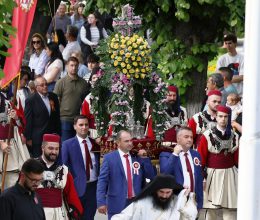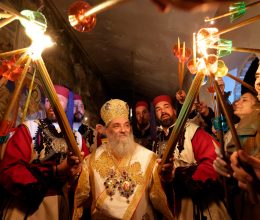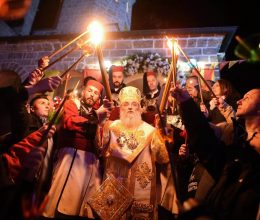+ B A R T H O L O M E W
By God’s Mercy
Archbishop of Constantinople-New Rome and Ecumenical Patriarch
To the Plenitude of the Church: May the Grace, Peace and Mercy
of Christ Risen in Glory be with you All
Dear venerable Hierarchs and beloved brothers and sisters in Christ,
The experience of Christ’s Resurrection, the all-saving victory of Life over Death, is the nucleus of faith, divine worship, ethos and culture of the Christ-loving orthodox people of God. The life of the Orthodox faithful, in all its manifestations and dimensions, is nurtured and nourished by faith in the Resurrection, and constitutes a daily Pascha. This paschal experience is not simply a remembrance of the Lord’s Resurrection but also a participation in our own renewal, and an unshakeable conviction about the eschatological perfection of all.
Primarily in the Eucharistic Liturgy, which is inextricably linked with the “chosen and holy day” of Sunday, the Orthodox Church celebrates this existential participation in Christ’s Resurrection and experiential foretaste of the blessings of God’s Kingdom. The resurrectional and delightful character of the Divine Eucharist is impressive, always occurring in an atmosphere of joy and gladness and depicting the ultimate renewal of all beings, the fulfillment of joy, the fullness of life and the future outpouring of love and knowledge.
It is about the redemptive vision of the present under the light of the end and the dynamic journey toward the kingdom. It is about the indissoluble relation and interweaving of the presence and eschatological nature of our salvation and the world’s transfiguration in Christ, which gives ecclesiastical life a unique dynamism and serves for the faithful as a stimulus of good witness in the world. The Orthodox believer has special reason and strong incentive to struggle against social wrongdoing because we are intensely conscious of the contrast between the end times and every historical event. From an Orthodox perspective, philanthropic service, helping our brothers and sisters in need—according to the Lord’s words that “inasmuch as you did it to one of the least of these my brethren, you did it to me” (Matt. 25:40) and the tangible love of the Good Samaritan that was shown in deed (see Lk. 10:30-37), as well as in accordance with the Patristic saying that “you should consider all those in need as your neighbor and feel that you are called to come to their aid” (Isidore of Pelusium)—constitutes an extension and expression of the Church’s Eucharistic ethos, a revelation that love is the quintessential experience of life in Christ, both in the present life and in the Kingdom of heaven.
It is in this context that we should also understand that liturgical life in the Orthodox Church is shaken by the experience of “common salvation”, the gift of “common freedom” and a “common kingdom”, as well as by the expectation of “common resurrection”. What prevails is the “we”, the community of life, co-participation and co-existence, as well as the sanctifying identification of freedom in Christ through sacrificial and doxological love. Such is the awe-inspiring message of the radiant icon of the Resurrection in the Descent of Christ into Hades. The Lord of glory descended into the depths of the earth and shattered the gates of Hades, emerging victorious and luminous from the tomb, not alone and bearing a banner of victory, but along with Adam and Eve, raising them up with himself, holding them tightly and supporting them. And in their persons, all of the human race and creation is also raised, held and supported.
The gospel of the Resurrection, this “common feast of all”, the abolishment of the power of death by almighty love, resounds today in a society replete with social injustice and reduction of the human person, in a world that resembles a Golgotha of refugees with myriads of innocent children. It announces from the depths that, in the face of God, human life has absolute value. It proclaims that sufferings and trials, both Cross and Golgotha, do not have the final word. It is impossible for crucifiers to triumph over their tragic victims. In the Orthodox Church, the Cross lies at the center of piety; however, it is not the ultimate reality that determines the final point of orientation in church life. The essential meaning of the Cross is that it constitutes a way to the Resurrection, to the fullness of our faith. On this foundation, the Orthodox proclaim: “For behold, through the Cross joy has come into all the world”. It is characteristic that in the Orthodox Church, the Service of the Passion is not depressing; instead, it is a mingling of the Cross and Resurrection, since the Passion is always approached and experienced through the Resurrection, which is our “ransom from sorrow”. For the Orthodox mindset, the enduring connection of the Cross and the Resurrection is incompatible with every form of esoteric flight to any false mysticism or self-sufficient pietism, which usually tend to be indifferent to the misfortunes and misadventures of humanity in history.
In our age, the message of the Cross and the Resurrection challenges the human being’s self-centeredness and arrogant self-glorification in a secular and rationalistic world—a human being who is convinced of the dominating power of science and is attached to earthly and temporary things, without any desire for eternity. It also combats any attempted repulsion of the Incarnation of the Word and the “scandal” of the Cross in the name of the absolute transcendence of God and the unbridgeable distance between heaven and earth.
In all these things, dear venerable hierarchs and beloved brothers and sisters in Christ, we Orthodox faithful—filled with the experience of the luminous Resurrection, receive light from the unwaning light and give thanks for all things, keeping our mind on heaven and already possessing from here the pledge and assurance of the eschatological fulfillment of Divine Economy, while also publicly proclaiming: “Christ is Risen!” Therefore, we pray that our Lord who suffered, was buried and arose, may illumine our minds, hearts and whole life, guiding our steps toward every good deed and strengthening His people to witness the Gospel of Love “to the end of the earth” (Acts 1:8) for the glory of His name that is “above all names”.
At the Phanar, Holy Pascha 2018
+ Bartholomew of Constantinople
Your fervent supplicant to the risen Christ
















